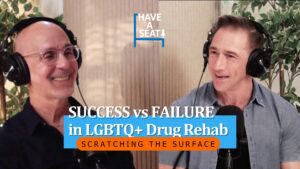The statistics on LGBTQ substance misuse paint a sobering picture: LGBTQ adults are 1.5 to 3 times more likely than heterosexuals to have an alcohol-use disorder or use illicit drugs.
But these figures only scratch the surface of a much deeper issue. From minority stress and discrimination to family rejection, LGBTQ people experience a unique set of risk factors that contribute to their higher rates of addiction and co-occurring mental health disorders.
Traditional treatment centers, while well-intentioned, lack the specialized understanding and inclusive environment necessary to address these challenges.
These are just a few of the reasons why LGBTQ addiction treatment matters. This article explores these reasons in more depth. In the process, it sheds light on the intricacies of substance abuse within the LGBTQ community and the transformative potential of affirming care.
Looking for LGBTQ-affirmative addiction treatment? Call La Fuente at 888.903.9898.
Substance Misuse Is Higher in the LGBTQ Community
There are several reasons why LGBTQ-affirming addiction treatment matters, but the most compelling is the high rate of substance abuse within the LGBTQ community.
To illustrate:
- LGBTQ adults are 1.5 to three times more likely than heterosexuals to meet the criteria for an alcohol-use disorder
- LGBTQ adults are 2 to 3 times more likely than heterosexuals to have used illicit drugs in the last year
- Gay men use illegal stimulants (crack, cocaine, methamphetamine), three times more than straight men (9.2% vs. 3.2%)
These statistics can be attributed to several factors, which we’ll explore in the next section.
LGBTQ People Have Unique Risk Factors
Addiction is a complex, chronic disease that arises from multiple risk factors. Genetics play a significant role, as having a family history of addiction increases the likelihood of developing a substance use disorder.
Similarly, a family history of mental health disorders, such as anxiety or depression, can contribute to the risk of addiction. Additionally, trauma or chronic stress can lead people to use substances as a way to numb pain and cope with emotions.
Beyond these general risk factors, LGBTQ individuals face unique challenges that increase their risk for addiction:
Mental health: LGBTQ people are 2.5 times more likely to experience depression, anxiety, and substance misuse compared with heterosexual individuals.
Minority stress: This term refers to the unique stress experienced by marginalized groups, including the LGBTQ community. It stems from external factors like discrimination, stigma, and social exclusion, as well as internal factors like internalized homophobia and the pressure to conceal one’s identity.
Discrimination and stigma: Whether it’s homophobia in the workplace, anti-trans bills in Congress, or street harassment, LGBTQ people frequently experience attacks on their health and well-being. Many turn to substances as a way of coping.
Family rejection: Studies show that family rejection is associated with poorer health outcomes. Specifically, LGBTQ people who experienced family rejection in adolescence were 3.4 times more likely to use illegal drugs as adults.
Violence: Members of the LGBTQ community are nine times more likely than non-LGBTQ people to be victims of violent hate crimes. Victims report feeling anxious, sad, or depressed, all of which may lead to substance abuse.
LGBTQ People Have Higher Rates of Co-Occurring Disorders
In addition to facing unique risk factors for substance use, studies reveal that LGBTQ people have higher rates of co-occurring mental health disorders.
Broadly, LGBTQ adults are more likely to meet the criteria for major depression and anxiety, as well as report suicidal thoughts and attempts.
Specific figures further highlight this disparity:
- Sexual minority males are 2 to 3 times more likely than heterosexual males to have experienced a major depressive episode in the past year. Among sexual minority females, 1 in 4 bisexual women reported a major depressive episode, compared to 1 in 10 heterosexual women.
- Three in 5 LGBTQ people report experiencing anxiety.
- Nearly half of transgender individuals have contemplated suicide.
Traditional Facilities Aren’t Designed for LGBTQ People
Although more and more treatment centers claim to provide LGBTQ-friendly care, what that actually means is unclear. For example, many substance abuse counselors have no formal training in LGBTQ issues and their connection to substance abuse.
Without specialized care, LGBTQ people struggle to address unique challenges like trauma, discrimination, family rejection, and homophobia/transphobia. As a result, those in traditional programs may find themselves caught in a cycle of sobriety and relapse.
Moreover, even if staff members have received training about LGBTQ substance abuse, treatment center residents may not be as accepting. This fear of judgment can prompt LGBTQ people to conceal their identities, something that fosters feelings of isolation and impedes the recovery process.
What LGBTQ-Affirming Rehab Centers Provide
LGBTQ-affirming rehab provides comprehensive care and an environment tailored to the unique needs of the LGBTQ community that go beyond traditional treatment centers.
One of the key aspects of these centers is cultural competence and inclusivity. Staff members are either part of the community themselves or otherwise undergo specialized training. This means they understand the unique challenges and experiences LGBTQ people face on the road to recovery.
Recognizing the stigma and discrimination LGBTQ people encounter in mainstream society, LGBTQ treatment centers prioritize creating a judgment-free space. Clients can express their identities without fear of rejection or discrimination. This fosters a sense of belonging that’s essential to recovery.
Peer support is another cornerstone of LGBTQ rehab centers. Through group therapy, peer-led discussions, and community activities, clients build meaningful relationships and draw strength from each other as they navigate the complexities of recovery.
Similarly, LGBTQ rehab centers encourage sober community building. From sober dinners to volunteer work, clients strengthen their commitment to sobriety and build meaningful, long-lasting connections that help them live productive sober lives.
La Fuente Is a Leading LGBTQ Treatment Center
Since opening our doors in 2005, La Fuente has made it our mission to support LGBTQ people in their journey to sobriety. As one of the few LGBTQ-affirming treatment centers in the United States, we’re committed to providing the highest standard of care possible.
What truly sets us apart is our team’s connection to the recovery process. Many of our staff members have gone through recovery themselves, are part of the LGBTQ community, or both. This firsthand experience means they bring a wealth of understanding and compassion to their work.
If you or a loved one is a member of the LGBTQ community struggling with substance abuse or addiction, contact us today at 888.903.9898.




